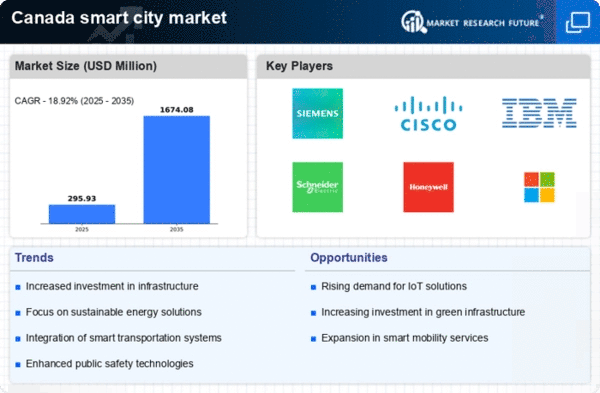Government Initiatives and Funding
Government initiatives play a crucial role in shaping the smart city market in Canada. Various federal and provincial programs are designed to promote sustainable urban development through financial support and policy frameworks. For example, the Smart Cities Challenge, launched by the Canadian government, has provided over $75 million in funding to municipalities for innovative projects that enhance urban living. This initiative encourages cities to leverage technology and data to address local challenges, thereby stimulating the smart city market. Furthermore, the commitment to reducing greenhouse gas emissions by 40-45% by 2030 aligns with the goals of smart city projects, as they often focus on energy efficiency and sustainability. Such government backing is likely to attract private investments, fostering a vibrant ecosystem for smart city solutions.
Public Safety and Security Concerns
Public safety and security are paramount concerns for urban residents in Canada, influencing the smart city market significantly. The integration of smart technologies, such as surveillance systems and emergency response solutions, is becoming increasingly vital for enhancing urban safety. Cities are investing in smart lighting and surveillance systems that utilize AI to monitor public spaces, potentially reducing crime rates by up to 20%. Additionally, the implementation of smart emergency response systems can improve response times, ensuring that citizens feel secure in their environments. As urban areas continue to grow, the demand for innovative safety solutions is likely to increase, driving the smart city market forward. This focus on public safety not only addresses immediate concerns but also fosters a sense of community trust and engagement.
Environmental Sustainability Initiatives
Environmental sustainability is a key driver of the smart city market in Canada, as cities strive to reduce their ecological footprint. Initiatives aimed at promoting green technologies and sustainable practices are gaining traction. For instance, cities are investing in smart waste management systems that optimize collection routes, potentially reducing operational costs by 25%. Furthermore, the adoption of renewable energy sources, such as solar and wind, is being integrated into urban planning. The Canadian government has set ambitious targets to achieve net-zero emissions by 2050, which aligns with the objectives of smart city projects. This focus on sustainability not only addresses climate change but also enhances the quality of life for residents. As environmental concerns continue to rise, the smart city market is likely to expand, driven by the demand for sustainable urban solutions.
Rising Urbanization and Population Growth
Canada is witnessing a significant trend of urbanization, with over 80% of its population residing in urban areas. This demographic shift is driving the demand for smart city solutions to address the challenges associated with increased population density. Cities like Vancouver and Calgary are experiencing rapid growth, necessitating the implementation of smart technologies to manage resources effectively. The smart city market is expected to grow as municipalities seek to enhance public services and improve transportation systems. Additionally, ensuring sustainable development is a key focus. According to projections, urban areas in Canada could see a population increase of 10 million by 2040, further intensifying the need for innovative solutions. This rising urbanization trend indicates a robust market potential for smart city initiatives aimed at improving urban living conditions.
Technological Advancements in Infrastructure
The smart city market in Canada is experiencing a surge due to rapid technological advancements in infrastructure. Innovations such as IoT, AI, and big data analytics are being integrated into urban planning and management. Innovations such as IoT, AI, and big data analytics are being integrated into urban planning and management. For instance, cities like Toronto are implementing smart traffic management systems that utilize real-time data to optimize traffic flow, potentially reducing congestion by up to 30%. This integration not only enhances operational efficiency but also improves the quality of life for residents. The Canadian government has allocated approximately $1.5 billion to support smart infrastructure projects, indicating a strong commitment to fostering a robust smart city market. As cities continue to adopt these technologies, the demand for smart solutions is likely to grow, further propelling the market forward.















